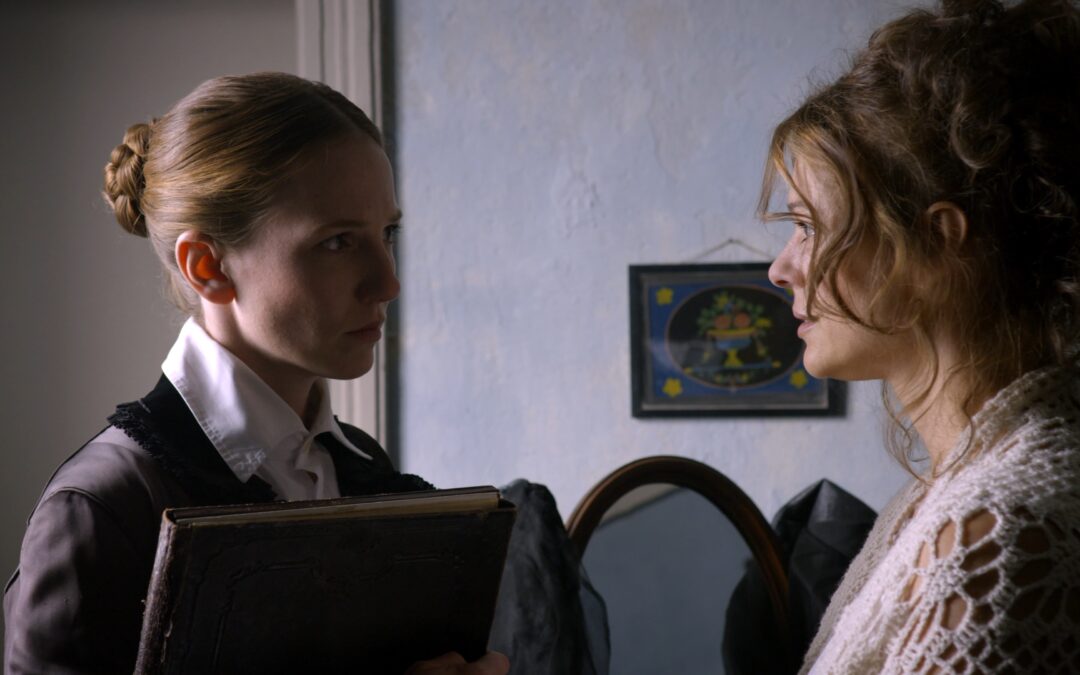(IMAGE: GeekFrog Media)
Nova Vento Entertainment. 2021. Drama. 85 minutes.
RATING: 2/4
Effigy: Poison and the City feels less like a movie than an episode of an international TV show my wife might dig up while searching Amazon Prime or Britbox. Call it Law and Order: Bremen 1828, perhaps, or German
Downton Abbey…With Poison. For fans of costumes, corsets, and subtle repudiations of institutional sexism from a century or so ago, it ought to hit the spot. But will it lure audiences back to theaters? That’s a more uphill fight.
Set in the first half of the 19th century, with steam trains a novelty poised to revolutionize trade once fully embraced, this begins as the story of Cato Bohmer (Elisa Thiemann), a rare woman aspiring to study law and hired as a clerk for Bremen’s local judge, who isn’t happy to learn her gender. Some mysterious deaths may or may not be poisonings, and the more both Cato and her boss Droste (Christoph Gottschalch) investigate, the more it seems
clear that beloved local widow Gesche Gottfried (Suzan Anbeh, French Kiss) may be responsible. Especially as more bodies start piling up, and it becomes apparent that in Bremen, arsenic-based mouse poison is really easy to come by. Like, local grocery-store easy.
Once the culprit is found, the story turns to making the case
against them, which was a good deal harder back then. Before full trials were a
thing in Germany, the judge would simply gather evidence and make a ruling, but
testimony only becomes admissible with two witnesses to it. The killer knows
this, of course, and thus selectively confesses when only one person is around
to hear. Adding to the stress is the mayor, or Burgermeister, of Bremen, who
wants to lure the railway to town and would rather not have it become known for
poisonings first.
The case of Gesche Gottfried is a matter of historical record in
Germany, but that doesn’t mean we need spoil the outcome here. Suffice it to
say that first-time director Udo Flohr, adapting a stage play based on the real
events, uses mostly brightly lit interiors and ultra-clean props and costumes
to tell the story in straightforward fashion. There are occasional hints of
same-sex attraction between Cato and Gesche, but unfortunately the movie
doesn’t go anywhere interesting with them.
Towards the end, Flohr occasionally gets creative with yellow
filters and lighting, but such moments stand out by being oddly
uncharacteristic. The rest of the time, it might as well still be a play,
albeit one with occasional inserts of beautiful old churches and other
character-enhancing buildings that look nowhere near the actual set.
Effigy claims to have been shortlisted for Germany’s Oscar nomination,
which either speaks well of the filmmakers’ optimism or poorly of the
competition. It’s not bad, exactly, but it’s not significantly better than a
typical procedural, with period costumes and setting as the novelty. And
Thiemann’s narration in English doesn’t help; it merely states things we ought
to already see or know. There’s an agreeably nasty surprise at the end that
makes up for a lot, though.
Another downside to Thiemann’s narration is it doesn’t let us
into the story at anything deeper than a superficial level. She tells us what
she does, and did, when it’s the things going on beneath the surface that we
need to feel. If, in the course of doing a man’s job, she cannot show her true
self, an interior monologue could add volumes. Yet it doesn’t. Likewise, the
killer’s motivations. What are they? While the actor in question certainly has charisma, they’re stuck in the role of “generic crazy person” that the goth kid
in your high school drama class always loved to play. There may be a method to
the madness, but we aren’t exactly privy to it.
If this were a TV pilot, I’d be curious to tune in and see Cato’s long-term arcs. As things stand, the most interesting aspect of Effigy is the case itself. Which one could simply read about.
###

